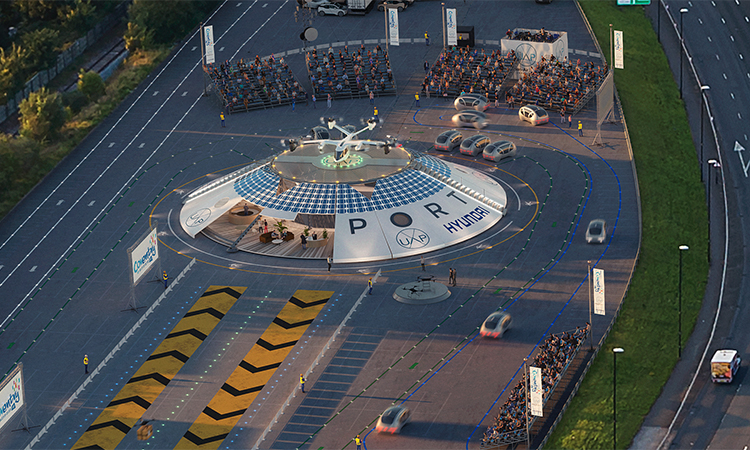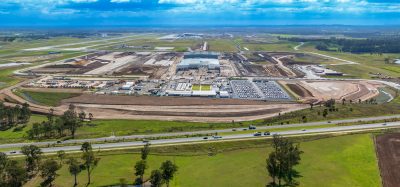Urban Air Port’s Air-One project receives £1.2 million for development of eVTOL infrastructure
- Like
- Digg
- Del
- Tumblr
- VKontakte
- Buffer
- Love This
- Odnoklassniki
- Meneame
- Blogger
- Amazon
- Yahoo Mail
- Gmail
- AOL
- Newsvine
- HackerNews
- Evernote
- MySpace
- Mail.ru
- Viadeo
- Line
- Comments
- Yummly
- SMS
- Viber
- Telegram
- Subscribe
- Skype
- Facebook Messenger
- Kakao
- LiveJournal
- Yammer
- Edgar
- Fintel
- Mix
- Instapaper
- Copy Link
Posted: 29 January 2021 | International Airport Review | No comments yet
The Air-One project will work to demonstrate how to unlock the potential of sustainable urban air mobility to reduce congestion, cut air pollution and holistically decarbonise transport.


Credit: Urban Air Port
Urban Air Port Air-One has been selected as a winner of the UK government’s Future Flight Challenge to develop aviation infrastructure and systems that enable the next generation of electric and autonomous air vehicles.
Air-One is a world-first fully-operational hub for future electric vertical take-off and landing (eVTOL) aircraft – such as cargo drones and air taxis – and is to be launched in Coventry, England, later in 2021.
Urban Air Port develops fully autonomous innovative zero emission infrastructure for future air mobility. The ambitious Air-One project will bring industry, government and the public together to demonstrate how to unlock the potential of sustainable urban air mobility to reduce congestion, cut air pollution and holistically decarbonise transport, while providing seamless passenger journeys and deliveries.
The National Aeronautics and Space Administration (NASA) predicts that urban-air mobility in the U.S. alone could be worth up to $500 billion in the near-term, and states that a significant barrier to market growth is the lack of infrastructure, an issue which Urban Air Port was established to resolve.
The Urban Air Mobility Division of Hyundai Motor Group has chosen Urban Air Port as its priority infrastructure partner to support the global growth of this new sector. The South Korean company plans to create its own eVTOL aircraft and support the broader urban air mobility eco-system. Hyundai Motor Group is supporting the development of Air-One as part of its plan to commercialise its aircraft by 2028.
Ricky Sandhu, Founder and Executive Chairman of Urban Air Port, said: “Cars need roads. Trains need rails. Planes need airports. eVTOLs will need Urban Air Ports. Over a hundred years ago, the world’s first commercial flight took off, creating the modern connected world. Urban Air Port will improve connectivity across our cities, boost productivity and help the UK to take the lead in a whole new clean global economy. Flying cars used to be a futuristic flight of fancy. Air-One will bring clean urban air transport to the masses and unleash a new airborne world of zero emission mobility.”
The physical footprint of an Urban Air Port is 60 per cent smaller than a traditional heliport (the most comparable existing infrastructure). Using innovative construction, the sites can be installed in a matter of days, emit net zero carbon emissions and can be operated completely off-grid, meaning that they do not always have to rely on a suitable grid connection.
Urban Air Port provides an integrated approach to the decarbonisation of cities. It is designed to support any eVTOL aircraft and compliments other modes of sustainable transport as a hub for electric vehicles, buses or scooters. The design enables Urban Air Ports to be easily moved to alternative sites, as the air-mobility sector develops. This design also means that the sites are ideal for disaster emergency management. Urban Air Ports can rapidly deploy drones and other eVTOL to collect and transport emergency supplies, equipment and people where needed.
UK Research and Innovation’s Future Flight Challenge Director, Gary Cutts, said: “Urban Air Port has the potential to revolutionise cities across the world, making them more connected, cleaner and accelerating our green economic recovery. This project epitomises the purpose of the Future Flight Challenge fund – it is innovation at its finest – and will help to position the UK at the vanguard of electric urban air mobility.”
The company plans to develop more than 200 sites in the next five years to meet global demand. Cities across the UK and many more globally have already expressed an interest in installing an Urban Air Port. Having secured funding for Air-One, Urban Air Port is now in discussions with investors to support its rapid commercialisation and global growth.
Urban Air Port has been awarded a £1.2 million grant from UK Research and Innovation’s Future Flight Challenge. The programme is funded by £125 million from the Industrial Strategy Challenge Fund and is expected to be matched by up to £175 million from the industry.
Related topics
Aircraft, Airside operations, Emissions, Funding and finance, Passenger experience and seamless travel, Sustainability, Sustainable development
Related organisations
Hyundai Motor Group, National Aeronautics and Space Administration (NASA), UK Government, UK Research and Innovation, Urban Air Port


















